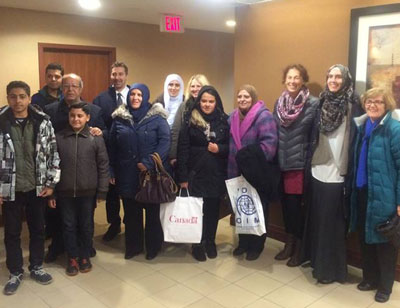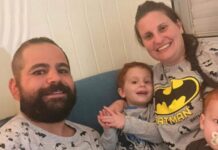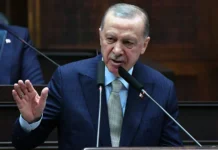It was the photo that finally brought home the true horror of the Syrian refugee crisis: 3-year-old Alan Kurdi, lying face down on a Turkish beach, arms at his side, waves lapping around his eyes. Kurdi drowned last September along with 12 other Syrians, including his mother and brother, while trying to cross the Mediterranean to safety.
Canadians were particularly horrified when they learned his family had been hoping to come to their country. Their horror deepened with the particularly tone deaf reaction of then Prime Minister Stephen Harper, then in the midst of an election campaign. Asked about the photo of Kurdi during last year’s election campaign, he replied, “We could drive ourselves crazy with grief if we look at the millions of people in danger.”
Although their government may not have been acting quickly, many Canadians—including members of a number of synagogues—felt compelled to do something, and to do it as quickly as possible.
Dan Moskovitz is the rabbi at Temple Sholom, a Reform congregation in Vancouver, B.C. He told me that during a conference call with members of the Canadian Conference of Reform Rabbis, which he chairs, “we were all talking about what can we do.”
The High Holidays were coming up, so Moskovitz took the opportunity to give a Yom Kippur sermon on the importance of helping Syrian refugees come to Canada. “I expected some push back from people that would feel this was not a Jewish problem, that we’re importing people—Muslims in particular—who have it in for the Jews and for Israel,” he said. “But I also knew we were all affected by what we had seen and heard in the media, and a slumber had sort of crept over us over the last four or five years, where we hadn’t paid much attention to this conflict and the crisis it was creating for families.”
The response was “amazing,” said Moskovitz: “Following the sermon, people were in tears. They came up to me in support. We sent an email after the holiday asking people to register their willingness to participate as volunteers and make a financial pledge. We were trying to raise $40,000 at that time, and we raised it in two days.” So, the synagogue decided to double its goal and sponsor two families. They have now brought in over $80,000.
Canada is the only country in the world with a sponsorship program allowing groups of individuals and community organizations to bring refugees into the country. The program was introduced in 1979, in response to the crisis surrounding the Vietnamese boat people. Privately sponsored families still have to be recognized as legitimate refugees (usually by the United Nations) and their applications processed by the federal government. But their sponsors are responsible for the full cost of feeding and housing them for a year and helping them become integrated into Canadian society. The amount required varies depending on the cost of living in different cities, but family sponsorship generally costs at least $30,000 in addition to donations of furniture, clothing, and other supplies, and a lot of volunteer time.
While Moskovitz started the ball rolling in Vancouver, “other rabbis were thinking the same thing,” he told me. Soon, about two dozen Canadian congregations—most, but not all, Reform—would become involved in sponsoring Syrian refugees.
***
Moskovitz moved to Vancouver from Los Angeles two years ago, and his reaction to hearing about Canada’s private sponsorship program was “disbelief.”
“I was truly quite impressed and floored that Canada lives these values,” he said. “I mean, they’re really Jewish values, and to know they are institutionalized in Canadian government policy is quite heartening. Look, 36 times in the Torah we are commanded to love the stranger, because we were once strangers in the land. You don’t repeat something 36 times in the Torah unless it’s really important. … We are supposed to see the world through the lens of our own experience, to see the suffering of others as though it were ours.”
While Temple Sholom was raising funds, more than 2,000 miles away the Shaarei-Beth El synagogue in Oakville, Ontario, outside Toronto, had already been working for months with a local church and mosque to sponsor a Syrian family together.
Aliya Khan, an endocrinologist and professor of medicine at McMaster University, is active in the Oakville mosque. Relationships between the three institutions were good, she said, but “we hadn’t formally worked together. It was sad that it took such a catastrophe. Our institutions have the same values, we have the same beliefs, and we need to reach out to each other and work together.”
Stephen Wise, Shaarei-Beth El’s rabbi, added, “We just wanted to get together and see if we could strengthen the connections between Jews, Muslims, and Christians, especially in light of events like the [Charlie Hebdo] attacks in Paris and in Ottawa [where a Canadian soldier was killed in 2014]. We organized a meeting at the synagogue, and we began a very frank and open discussion about violence and religion and Israel—all the issues that you normally don’t want to talk about.”
That was in spring of last year. A few weeks later, Wise said, a local Muslim woman approached the mosque about sponsoring her brother’s family, who had been stuck in Jordan for years with no jobs and no education for their children.
“When I first brought it to our synagogue leadership, there was some concern,” Wise said. “Why are we helping Syrians in light of the relationship between Israel and Syria? What are other Muslim countries doing? Is this the best use of our fundraising? Who are these Syrians who are coming over? Are they radical? Are they going to separate themselves, or are they going to enter Canadian society and be part of this mosaic? We confronted all those tough questions early on and still decided to continue. And then in the summer we started to hear more reports, and then the picture of Alan Kurdi, and by then everyone was on board.”
Together, the three organizations in Oakville raised $34,000, with Shaarei-Beth El contributing $5,000. Wise says they have continued to fund-raise and are currently contributing to sponsor a second family.
Some American Jews also wanted to help, but with no private refugee sponsorship system, and a government that seemed to be in no hurry to facilitate Syrian refugee claimants, they were constrained in what they could do. Daniel Gropper, rabbi of the Community Synagogue of Rye, New York, in Westchester County, told me: “It became clear as we put a small working group together at the synagogue that there was almost a sense of frustration. Can’t we do more? The advocacy piece—you know, it’s great, you make phone calls. But is that really effecting any change? It became clear quickly to me that the Canadian congregations are able to do a lot more.”
Gropper grew up in Vancouver and attended Temple Sholom, so he called together his executive committee and proposed they help raise funds for the Canadian synagogue’s sponsorship effort. “We realized this is a way for people from our synagogue to help directly,” he said. “So, people on the most basic level could donate funds, but what we know is that there will hopefully be the opportunity, once these families are settled in Vancouver—through Skype and email and different ways—to create an ongoing relationship. And, right now given what the exchange rate is with the Canadian dollar, it’s a huge bonus for Americans trying to support Canadian communities who are trying to raise this money.” In late January, his synagogue sent a check for $3,000 to Temple Sholom.
***
Despite the response to Moskovitz’s Yom Kippur sermon, he admits not everyone was enthusiastic about the sponsorship plan. He says opposition came primarily from two groups: Jewish immigrants, “particularly from the former Soviet Union, who had had first-hand experience with Muslim migrants and were concerned that this was a group of people who were not compatible with Canadian or Western values,” and those worried “that Israel was in crisis and that Syria was no friend of Israel.”
Sandy Baker, a retired teacher who has been a member of Temple Sholom since 1980, says she was “annoyed” by the Yom Kippur sermon: “I didn’t like the analogy between the Holocaust and the Syrian crisis. I understand where he’s coming from, and I know that this is a common theme with rabbis and other people: Look at us, we went through the Holocaust, we know what it’s like. The Holocaust is one thing and Muslims killing Muslims is another.”
Temple Sholom is sponsoring two Kurdish families, and they were introduced to the congregation by video from the Middle East during a town hall meeting in November. “The whole congregation sort of let out an audible sigh of relief,” said Moskovitz. “They recognized these were people that could have been their neighbors and they were running for their lives.”
“I sat in the audience and watched it,” Baker said. “They seemed like nice people, and I can only hope that they are.” But that doesn’t mitigate her concerns. “I am still very critical,” she said. “I don’t hate Muslims, but I am afraid.”
Canadians elected a new Liberal government in October 2015, and one of its key promises was to speed up the processing of Syrian refugees and bring in 25,000 within a year.

On Dec. 20, the family sponsored by the Oakville group—Riyad and Nadia Al-Balkhi, along with their five children ages 12 to 20—arrived in Toronto. “They just want to be safe and be able go to school, earn a living, and go shopping without fear of being attacked,” said Wise. “And I think they are very curious about Judaism and the Jews here in our synagogue that helped them. They ask questions about how we pray and what we eat and our prophets.”
The Al-Balkhis fled Syria in 2012 and applied to come to Canada over a year ago. After three and a half years of living in a cramped apartment in Jordan—unable to work or send their children to school—they now live in a three-bedroom townhouse in Mississauga, a suburb of Toronto. The three youngest children are going to school, while the oldest, ages 19 and 20, began language classes along with their parents this month.
Riyad Al-Balkhi says they hadn’t known at first that one of the groups sponsoring them was Jewish. He calls Wise “a good guy” who has been helpful to the family and said they were happy to accept an invitation for a Shabbat meal at the synagogue. (It was both kosher and halal.) “All people are good,” whether they are Muslims or Christians or Jews, Al-Balkhi said. “I see here in Canada it is like this. Not like in Syria or other countries. They said we have some dinner for you and your family, and we say, ‘Why not?’ ”
Gropper said, “At the end of the day, this is actually going to be good for the Jewish people, in the sense that people who would otherwise think we are the enemy, learn that Jews help. Jews help people.”
While Moskovitz is clearly proud of the response of Canada’s Jewish community, he still thinks more could be done. “The churches have been doing this work for decades. It’s quite sad, I think, in terms of the state of the Jewish community that here we are, an immigrant people—the eternal immigrant and other—and we aren’t doing refugee work. Not nearly at the level that the churches are doing it.”
Wise agrees that “synagogues probably could do more.”
“It’s taken awhile for us to move past our own feeling,” said Wise. “I think many Jews still feel that we are refugees. Even though we do a lot of social justice work, sponsoring of refugees is not up there at the top, but this experience for our synagogue and for synagogues across Canada might be seen as something of a watershed moment. Some synagogues quickly got on board, some sponsoring one, two, three families—so there was a real sense that yeah, we synagogues can do this. We can help refugees.”


























